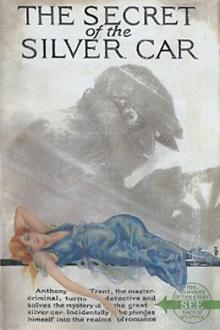The Secret of the Silver Car - Wyndham Martyn (red white royal blue txt) 📗

- Author: Wyndham Martyn
- Performer: -
Book online «The Secret of the Silver Car - Wyndham Martyn (red white royal blue txt) 📗». Author Wyndham Martyn
“So that’s why you said it didn’t matter much if I could see or not?”
“Does it?” the man asked shortly.
“Have you another match?” Trent asked presently. “I’d like to explore.”
“No good,” the other retorted. “I’ve been all round the damned place and there isn’t a chance, except that the thing may collapse and bury us.”
“Then we are to starve to death without an effort?”
“We shall asphyxiate, we shan’t starve. Don’t you notice how heavy the air is? Presently we shall get drowsy. Already I feel light headed and inclined to talk.”
“Then talk,” Trent said, “Anything is better than sitting here and waiting. The air is heavy; I notice it now. I suppose I’m going to be delirious. Talk, damn you, talk. Why not tell me your name? What difference can it make to you now? Are you afraid? Have you done things you’re ashamed of? Why let that worry you since it only proves you’re human.”,!
“I’m not ashamed of what I’ve done,” the other drawled, “it’s my family which persists in saying I’ve disgraced it.”
Anthony Trent was in a strange mood. Ordinarily secretive to a degree and fearful always of dropping a hint that might draw suspicion to his ways of life, he found himself laughing in a good humored way that this English soldier should imagine he must conceal his name for fear of disgrace. Why the man was a child, a pigmy compared with Anthony Trent. He had perhaps disobeyed an autocrat father or possibly married a chorus girl instead of a blue blooded maiden.
“You’ve probably done nothing,” said Trent. “It may be you were expelled from school or university and that makes you think you are a desperate character.”
There was silence for a moment or so.
“As it happens,” the unknown said, “I was expelled from Harrow and kicked out of Trinity but it isn’t for that I’m known in the army as Private William Smith of the 78th Battalion, City of London Regiment.”
“I thought you were an officer,” Trent said. Private Smith had the kind of voice which Trent associated with the aristocracy.
“I’m just a plain private like you,” Smith said, “although the lowly rank is mine for probably far different reasons.”
“I’m not so sure of that,” Trent said, a trifle nettled. “I could have had a commission if I wanted it.”
“I did have one,” Smith returned, “but I didn’t mean what I said offensively. I meant only that I dare not accept a commission.”
Anthony Trent waited a moment before he answered.
“I’m not so sure of that,” he said again.
The reasons for which Trent declined his commission and thereby endured certain hardships not unconnected with sleeping quarters and noisy companionship were entirely to his credit. Always with the fear of exposure before his eyes he did not want to place odium on the status of the American officer as he would have done had screaming headlines in the papers spoken of the capture by police authorities of Lieutenant Anthony Trent the cleverest of modern crooks. But he could not bring himself to speak of this even in his present unusual mood.
“It doesn’t matter now very much,” Smith said laughing a little, “we shall both be called missing and the prison camps will be searched for us. In the end my family may revere my memory and yours call you its chief glory.”
“I haven’t a family,” Trent said. “I used to be sorry for it. I’m glad now.” He stopped suddenly. “Do you know,” he said later, “you were laughing just now. You’re either crazy or else you must have your nerve with you still.”
“I may be crazy,” returned Private Smith, “but I usually make my living by having my nerve with me as you call it. It has been my downfall. If I had been a good, moral child, amenable to discipline I might have commanded a regiment instead of being a ‘tommy’ and I might be repenting now. By the way you don’t seem as depressed as one might expect. Why?”
“After a year of this war one doesn’t easily lose the habit of laughing at death.”
“I’ve had four years of it,” Smith said. “I was a ranker when it broke out and saw the whole show from August 1914. On the whole what is coming will be a rest. I don’t know how they manage these things in your country but in England when a man has been, well call it unwise, there is always a chance of feeling a heavy hand on one’s shoulder and hearing a voice saying in one’s ear, ‘I arrest you in the King’s name!’ Very dramatic and impressive and all that sort of thing, but wearing on the nerves—very.” Private Smith laughed gently, “I’m afraid you are dying in rather bad company.”
“We have something in common perhaps,” Trent said. He grinned to himself in the covering blackness as he said it. “Tell me, did you ever hear of Anthony Trent?”
“Never,” Private Smith returned quickly. “Sorry! I suppose I ought to know all about him. What has he done?”
“He wrote stories of super-crookdom for one thing.”
“That explains it,” Smith asserted, “You see those stories rather bore me. I read them when I was young and innocent but now I know how extremely fictional they are; written for the greater part, I’m informed, by blameless women in boarding houses. I like reading the real thing.”
“What do you mean by that?”
“Reports of actual crimes as set forth in the newspapers. Cross-examinations of witnesses and all that, summing up of the judges and coroners’ inquests. Was this Trent person really good?”
“You shall judge,” said the American. “He wrote of crimes and criminals from what such actual practitioners had told him. He was for a time a police reporter on a big New York paper and had to hang around Mulberry Street. After that he tried the magazines but as editors are so remote as a rule from actual knowledge of the world’s play and work, he didn’t make much money at it. Finally his pet editor—a man with some human attributes—said in effect, ‘I can’t raise your rates; the publisher won’t stand for it. If I paid decent prices he couldn’t buy champagne and entertain his favorites.’ This was in the era before prohibition. The human editor went on giving advice and wound up by saying, ‘Why don’t you do what your super-crook character does and relieve the dishonest rich of their stolen bonds? Con way Parker gets away with it, why shouldn’t you?’”
“Of course he was rotting?” Private Smith asked.
“Yes,” the American said, “He didn’t really mean it but the thought germs fell into the right sort of broth. Anthony Trent wasn’t naturally a crook but he hated having to live in a cheap boarding house and eat badly cooked meals and play on a hard-mouthed, hired, upright piano. Some ancestor had dowered him with a love of beautiful things, rugs, pictures, pottery, bronzes, music and a rather secluded life. Also he had dreams about being a great composer. He was a queer mixture. On the whole rather unbalanced I suppose. His father died and left him almost nothing. All he could do was newspaper work at first.”
“You mean he actually followed the editor’s advice?”
“Yes. He had certain natural gifts to aid him. He was a first rate mimic. It’s a sort of gift I suppose. He had gone in for amateur theatricals at his college and done rather well. He pulled off his first job successfully but the butler saw him and did not forget. That was the trouble the butler remembered. It wasn’t a big affair. It didn’t make any such stir as for example as when he took the Mount Aubyn Ruby.”
“I read of that,” Smith returned eagerly, “He knocked out a millionaire surrounded with detectives and got away in an airplane.”
“He got away but not in an airplane,” replied Anthony Trent. “On the whole the unknown aviator was rather useful to him but was absolutely blameless. Then there was the case of the Apthorpe emerald. Did you hear of that?”
“Haven’t I told you,” Smith returned impatiently, “that I read all about things of that sort? How could I have missed that even though I was in the trenches when it happened. It was the delight of my hospital life to read about it in Reynolds Journal. It was said a woman murdered old Apthorpe for it.”
“She did,” Trent admitted, “and she took the emerald but Anthony Trent got it from her and fooled them all. His last big job before the United States got into the war was getting the blue-white diamond that was known as the Nizam’s Diamond.”
“A hundred carat stone,” Smith said reverently. “By Jove, what a master! As I never heard of him of course he was never caught. They are all caught in the end, though. His day will come.”
For a moment the thought that Anthony Trent’s life was coming to an end before many hours had passed took the narrator from his mood of triumph into a state of depression. To have to give up everything and die in the darkness. Exit Anthony Trent for all time! And as he thought of his enemies the police toiling for the rich rewards that they would never get for apprehending him his black mood passed and Smith heard him chuckle.
“They all get caught in the end,” Smith repeated, “the best of them. The doctrine of averages is against them. Your Anthony Trent is one lone man fighting against so many. He may have the luck with him so far but there’s only one end to it. They got Captain Despard and he was a tophole marauder. They got our estimable Charles Peace and they electrocuted Regan in your own country only last month and he was clever, God knows. I think I’d back your Trent man against any single opponent, but the odds are too great. The pack will pull him down and break him up some day.”
Again Private Smith of the City of London regiment heard the man he had rescued from danger to present him with death, laugh a curious triumphant laugh. He had seen so much of war’s terror that he supposed the man was going mad. It would perhaps be a more merciful end.
“No,” said the American, “Anthony Trent will never be discovered. He will be the one great criminal who will escape to the confusion of the detectives of New York and London. I am Anthony Trent”
THE BEGINNING OF THE SEARCH“You?” cried Private Smith. “Ye Gods! And I haven’t even a match left so I can see you before we go. I die in better company than I know.” Trent could hear that he raised himself slowly and painfully to his feet. Then he heard the soldier’s heels click smartly together. “Ave Caesar—” he began. But the immortal speech of those gladiators being about to die was not finished.
There broke on Trent’s astonished gaze a flash of sunlight that made him blink painfully. And the terrifying noise of high explosive hurt his ears and that swift dreadful sucking of the air that followed such explosions was about him again in its intensity. He had been dug out of





Comments (0)